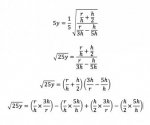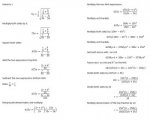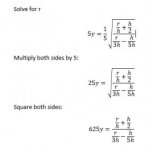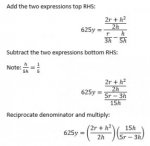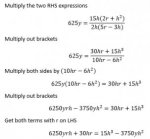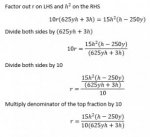Trying to transpose this formula to make r the subject.
. . . . .\(\displaystyle 5y\, =\, \dfrac{1}{5}\, \sqrt{\strut \dfrac{\dfrac{r}{h}\, +\, \dfrac{h}{2}}{\dfrac{r}{3h}\, -\, \dfrac{h}{5h}}\,}\)
Got this far but don't think I am heading on the correct path.
. . . . .\(\displaystyle \sqrt{\strut 25y\,}\, =\, \dfrac{\dfrac{r}{h}\, +\, \dfrac{h}{2}}{\dfrac{r}{3h}\, -\, \dfrac{h}{5h}}\)
. . . . .\(\displaystyle \sqrt{\strut 25y\,}\, =\, \left(\dfrac{r}{h}\, +\, \dfrac{h}{2}\right)\, \left(\dfrac{3h}{r}\, -\, \dfrac{5h}{h}\right)\)
. . . . .\(\displaystyle \sqrt{\strut 25y\,}\, =\, \left(\dfrac{r}{h}\, \times\, \dfrac{3h}{r}\right)\, -\, \left(\dfrac{r}{h}\, \times\, \dfrac{5h}{h}\right)\, +\, \left(\dfrac{h}{2}\, \times\, \dfrac{3h}{r}\right)\, -\, \left(\dfrac{h}{2}\, \times\, \dfrac{5h}{h}\right)\)
Any help would be most welcome!
. . . . .\(\displaystyle 5y\, =\, \dfrac{1}{5}\, \sqrt{\strut \dfrac{\dfrac{r}{h}\, +\, \dfrac{h}{2}}{\dfrac{r}{3h}\, -\, \dfrac{h}{5h}}\,}\)
Got this far but don't think I am heading on the correct path.
. . . . .\(\displaystyle \sqrt{\strut 25y\,}\, =\, \dfrac{\dfrac{r}{h}\, +\, \dfrac{h}{2}}{\dfrac{r}{3h}\, -\, \dfrac{h}{5h}}\)
. . . . .\(\displaystyle \sqrt{\strut 25y\,}\, =\, \left(\dfrac{r}{h}\, +\, \dfrac{h}{2}\right)\, \left(\dfrac{3h}{r}\, -\, \dfrac{5h}{h}\right)\)
. . . . .\(\displaystyle \sqrt{\strut 25y\,}\, =\, \left(\dfrac{r}{h}\, \times\, \dfrac{3h}{r}\right)\, -\, \left(\dfrac{r}{h}\, \times\, \dfrac{5h}{h}\right)\, +\, \left(\dfrac{h}{2}\, \times\, \dfrac{3h}{r}\right)\, -\, \left(\dfrac{h}{2}\, \times\, \dfrac{5h}{h}\right)\)
Any help would be most welcome!
Attachments
Last edited by a moderator:

